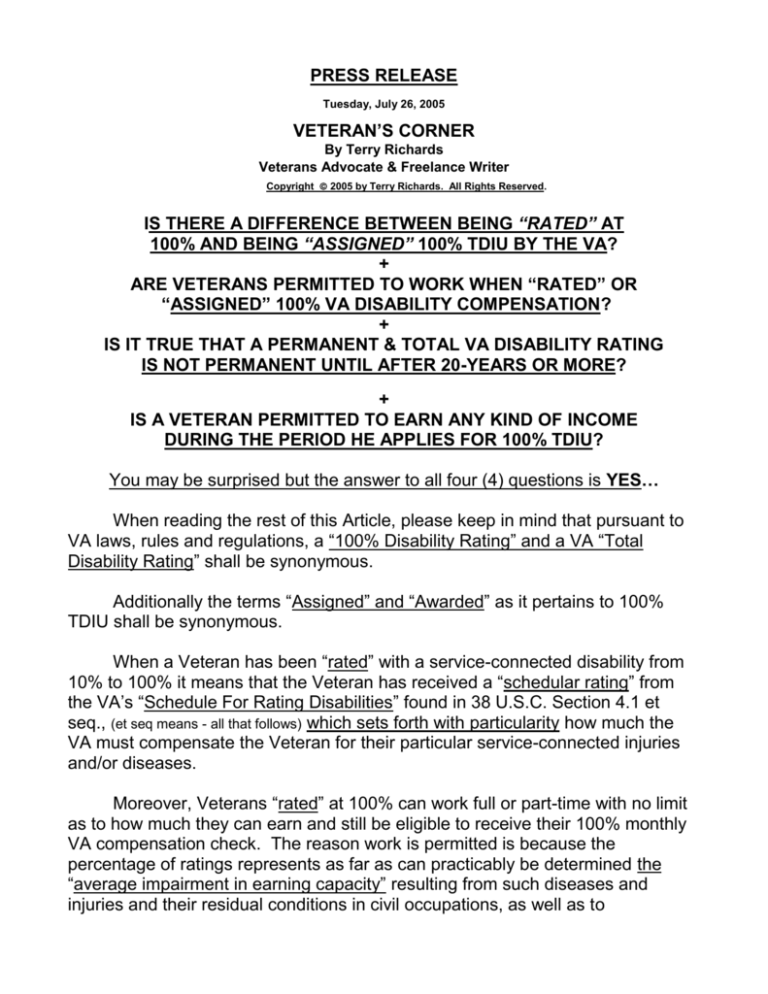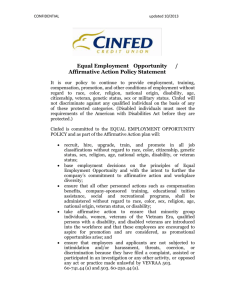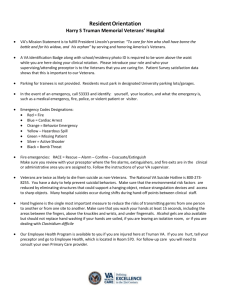
PRESS RELEASE
Tuesday, July 26, 2005
VETERAN’S CORNER
By Terry Richards
Veterans Advocate & Freelance Writer
Copyright 2005 by Terry Richards. All Rights Reserved.
IS THERE A DIFFERENCE BETWEEN BEING “RATED” AT
100% AND BEING “ASSIGNED” 100% TDIU BY THE VA?
+
ARE VETERANS PERMITTED TO WORK WHEN “RATED” OR
“ASSIGNED” 100% VA DISABILITY COMPENSATION?
+
IS IT TRUE THAT A PERMANENT & TOTAL VA DISABILITY RATING
IS NOT PERMANENT UNTIL AFTER 20-YEARS OR MORE?
+
IS A VETERAN PERMITTED TO EARN ANY KIND OF INCOME
DURING THE PERIOD HE APPLIES FOR 100% TDIU?
You may be surprised but the answer to all four (4) questions is YES…
When reading the rest of this Article, please keep in mind that pursuant to
VA laws, rules and regulations, a “100% Disability Rating” and a VA “Total
Disability Rating” shall be synonymous.
Additionally the terms “Assigned” and “Awarded” as it pertains to 100%
TDIU shall be synonymous.
When a Veteran has been “rated” with a service-connected disability from
10% to 100% it means that the Veteran has received a “schedular rating” from
the VA’s “Schedule For Rating Disabilities” found in 38 U.S.C. Section 4.1 et
seq., (et seq means - all that follows) which sets forth with particularity how much the
VA must compensate the Veteran for their particular service-connected injuries
and/or diseases.
Moreover, Veterans “rated” at 100% can work full or part-time with no limit
as to how much they can earn and still be eligible to receive their 100% monthly
VA compensation check. The reason work is permitted is because the
percentage of ratings represents as far as can practicably be determined the
“average impairment in earning capacity” resulting from such diseases and
injuries and their residual conditions in civil occupations, as well as to
compensate Veterans for pain and suffering throughout their lifetime, among
other things. See 38 CFR Section 4.15.
To further help you understand why a Veteran is permitted to perform
Substantial Gainful Activity (SGA) while being “rated” 100% service-connected by
the VA, is by placing an emphasis on “average impairment in earning capacity,”
as opposed to being compensated for the average “total loses” in earning
capacity over a lifetime. Furthermore, Black’s Law Dictionary Seventh Edition
defines “impairment” as: “The fact or state of being damaged, weakened or
diminished.” And it defines “compensation” as: ”Payment for damages, or any
other act that a court orders to be done by a person who has caused injury to
another and must therefore make the other whole.”
However, total disability ratings for compensation based on
umemployability of the individual Veteran a/k/a 100% TDIU (Total Disability based
upon Individual Unemployability) may be “assigned” where the “schedular rating” is less
than total, and when the disabled person is, in the judgment of the rating agency,
unable to secure or follow a substantially gainful occupation as a result of
service-connected disabilities as opposed to the percentage of ratings
representing the “average impairment in earning capacity.”
Veterans who have been “awarded” 100% TDIU can only earn up to the
MAPR (Maximum Annual Pension Rate) which is currently $846 per month or
$10,152 Annually and still be eligible to receive their 100% TDIU monthly VA
compensation check. See 38 CFR Section 4.16(a) for details.
Veterans should keep in mind that all injuries or diseases for which a
Veteran receives service-connected disability compensation regardless of
percentage, can be “re-evaluated” at any time.
Additionally, pursuant to 38 USCS Section 110 – Preservation of Disability
Ratings states in pertinent part that: A rating of “total disability” or “permanent
total disability” which has been continuously in force for twenty or more years
shall not be reduced thereafter, except upon showing that such rating was based
on fraud.”
In layman’s terms this means that even though you might have been furnished
with a letter from the VA that states your “disability” is “permanent total disability,”
unless you’ve actually received permanent and total disability for 20-years or
more, the VA can re-evaluate your claim at any time and reduce your percentage
of VA disability compensation.
Furthermore, all Veterans should duly note that a Veteran with absolutely
“no rating” whatsoever at the time the Veteran applies for VA disability
compensation can still be Granted and “rated” with a 100% “schedular rating.”
This is also true in the case of 100% TDIU or a Non-Service Connected Disability
Pension based upon what the VA calls “extra-schedular ratings.” See 38 CFR
4.16(b), and 38 CFR 4.17(a) and (b).
The “extra-schedular rating” rule will lay to rest the “myth” that the only way
a Veteran can obtain 100% TDIU is if the Veteran has at least one disability rated
at 40% or more, and sufficient additional disabilities to bring the combined rating
to 70% or more.
About 4-years ago, a Veteran was referred to me for assistance. He had
been rated at 70% for many years but then eventually was “awarded” 100%
TDIU which he had been collecting for a couple of years. He showed me a letter
from the VA saying that records they received from the IRS and Social Security
Administration reflected that the Veteran had been working for about 4-months
during the period he applied for a “Total Disability Rating”, and therefore, the VA
was going to revoke his 100% TDIU and return him to 70% service-connected
compensation, unless he could site a legal reason why the VA should not. So I
researched 38 CFR (Code of Federal Regulations) and 38 USCS (United States
Code Service) and found the legal reason why the VA could not revoke his “Total
Disability Rating.”
The legal reason why the VA could not revoke his “Total Disability Rating”
lies in 38 USCS Section 1163, of which I paraphrase as follows: “The disability
rating of a Veteran who begins to engage in a substantial gainful occupation after
January 31, 1985, may not be reduced on the basis of the Veteran having
secured and followed a substantially gainful occupation unless the Veteran
maintains such an occupation for 12 consecutive months.
UNITED STATES CODE SERVICE (USCS)
http://www4.law.cornell.edu/uscode/
CODE OF FEDERAL REGULATIONS (CFR)
http://www4.law.cornell.edu/cfr/
ABOUT THE WRITER + CONTACT INFORMATION
U.S. Army, February 15, 1968 – November 30, 1970. Rank at Discharge: Sergeant E-5 MOS: 95B40 – Military
Policeman, Desk Sergeant, and Platoon Sergeant. Tours of Duty: 287 th Military Police Company West Berlin,
Germany. “Checkpoint Alpha,” Helmstedt Brigade, Helmstedt, West Germany. 4 th Missile Command, Camp Page,
Chunchon, Korea.
Independent Veterans Advocate since 1990 (Non-Compensated).
Publisher and Writer of Veterans Corner By Terry Richards (Non-Compensated).
Freelance Writer/Journalist Specializing in Veterans Affairs (Occasionally Compensated).
Contributing Writer for the Veterans Post News, St. Petersburg, FL (Non-Compensated).
Member and Florida Registered Voter of the Veterans Party of America.
Former Volunteer Managing Editor of the Veterans Free Press Newspaper which was
chosen to be “archived” on the Internet by the “Internet Archive Organization”
http://web.archive.org/web/20010518204121/http://www.veteransfreepress.com/
Contact Terry Richards Veterans Advocate veteranscorner@yahoo.com
WEBSITE LINKS
VETERANS FREE PRESS “ARCHIVED” WEBSITE”
http://web.archive.org/web/20010518204121/http://www.veteransfreepress.com/
VETERANS PARTY OF AMERICA
http://www.VeteransParty.us
VETERANS POST NEWS
http://www.VeteransPostNews.com
VETERANS FOR VETERANS CONNECTION
http://www.vfvc.net
VOICE FOR VETERANS SERVICE
http://www.vfvs.com
THE AMERCIAN VETERANS NETWORK
http://www.theavn.org






